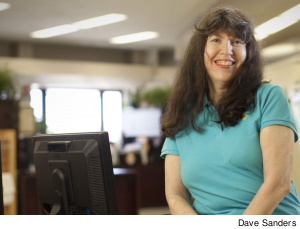Marjorie Deutsch has been a PSC member since 1998, but until the Pathways referendum, she had never been especially active in the union. That changed when Deutsch received a phone call from Judy Barbanel, then chair of the union chapter at Queensborough Community College (QCC), urging her to vote on the Pathways referendum.
“It resonated with something inside of me,” said Deutsch, an associate professor of business at QCC. “I realized in that moment that doing nothing was to be a part of the problem.” Deutsch decided she wanted to become active in the PSC’s efforts to encourage members to vote.
Phone Calls
The referendum was held from May 9 to May 31 among CUNY’s full-time faculty, and during the final week, Deutsch spoke with the other members of her department. She also made phone calls to other colleagues at QCC.
 |
“I found a lot of people wanted to talk about it [Pathways],” Deutsch told Clarion. All it took, she said, was someone to reach out and start the conversation.
When ballots were tabulated May 31 by the American Arbitration Association, more than 60% of CUNY’s 7,202 full-time faculty had participated in the referendum with 92% voting “no confidence” in Pathways. This impressive display of faculty opposition to Pathways was aided by hundreds of PSC members like Deutsch, talking with their colleagues in thousands of conversations across the CUNY system.
“We’re all inundated with e-mails,” said Barbanel. “But there’s nothing like getting a phone call or having a personal conversation.”
At Queens College, people in departments across the campus took responsibility for speaking to their colleagues. “It was a total mobilization,” said Jonathan Buchsbaum, professor of media studies and chapter chair at Queens College. “Arguably the strongest opposition [at QC] came from the sciences.”
‘Systematic’
At Borough of Manhattan Community College (BMCC), “we did the most systematic and wide-reaching outreach effort in the time since I have been here,” Geoff Kurtz, associate professor of political science, told Clarion.
“I engaged with people I’ve never met before because we have so many new faculty on campus,” said Anne Friedman, a professor of developmental skills who has taught at BMCC since 1986. Friedman noted that being a good listener was essential to successful outreach: “People generally like having someone from the union to come to talk and sit down with them.”
Acting LaGuardia Chapter Chair Danny Lynch agreed that careful listening was key to the union’s outreach effort. “I often asked people what they want for the University,” Lynch told Clarion. Quality education and real, shared governance were often cited, and both were widely seen as threatened by the Pathways project. Voting no-confidence in the referendum became a way for people to express those concerns, said Lynch.
Secret Ballot
Voting in the referendum was by secret ballot – an important factor given the heavy-handed pressure that was often part of Pathways implementation. “There were a lot of threats that went with the Pathways propaganda,” said Hester Eisenstein, professor of sociology and women’s studies at Queens College and the Graduate Center. For example, she told Clarion, some department chairs were threatened with loss of resources and faculty lines for their departments if they opposed Pathways implementation. “Because the referendum was anonymous, some people came out against Pathways who couldn’t do so otherwise,” said Eisenstein. “People used it as an opportunity to express how they really felt.”
“Some chairs sent out messages encouraging department members to vote their consciences,” added Buchsbaum. “In effect, this meant to vote no-confidence in Pathways,” he told Clarion, since opposition to Pathways is so widespread.
Sigmund Shen, associate professor of English, said that LaGuardia Community College faculty had become increasingly willing to discuss their thoughts about Pathways as a result of ongoing organizing around the issue throughout the year. The referendum both built on and contributed to this shift. “The dialogue has become broader and people are more comfortable raising problems with Pathways and speaking about the importance of governance,” said Shen, who did “walk-throughs” during the referendum, visiting members in their offices and urging them to vote.
Frank Crocco, an associate professor of English at BMCC, did a walk-through in his department. When members expressed concern that their votes would be meaningless Crocco reminded them that a strong faculty rejection of Pathways could help the PSC’s ongoing lawsuit against Pathways. He also noted that a strong no-confidence vote would strengthen faculty across the country who are fighting similar top-down efforts by university administrators to water down the curriculum in a time of budgetary austerity.
End of Semester
With anti-Pathways sentiment running high at Brooklyn College (BC), acting Chapter Chair Alex Vitale said he focused on making sure people had received their ballots and remembered to cast them as they were winding up the semester.
BC Sociology Department Chair Carolina Bank Muñoz spoke with her fellow chairs about the vote; she also made phone calls to about 30 colleagues. “Ninety percent of people were favorable” to a vote of no confidence, said Bank Muñoz – a percentage that held true in the final results across the University.
Future Initiatives
With a clear-cut majority of CUNY’s full-time faculty voting “no confidence” in Pathways, the vote reflected the broad discontent with Pathways on CUNY campuses. In the wake of the vote, the administration has stopped claiming that its plan is “faculty-driven.”
PSC activists say the skills and experiences gained during the referendum campaign will strengthen future union initiatives, on Pathways and beyond. “My hope is with my activity I can get other junior faculty involved in the union,” said Matt Lau, assistant professor of English at QCC, who spoke with a couple dozen other members during the referendum vote. Lau is glad to be part of a democratic union, saying, “I want to get others involved, too.”
“Everything on the union’s agenda depends on member involvement,” commented Barbanel. “The organizing we did for the Pathways referendum will definitely have a longer-term effect.”

